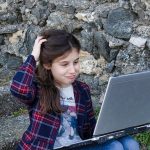 Jacqueline Geekie is the CILIP Information Literacy Group’s rep for public libraries. She is also the Information Literacy and Learning Librarian for Aberdeenshire Libraries. In this blog post, she reflects on two events that she has attended online, each broadly focussing on young people and technology.
Jacqueline Geekie is the CILIP Information Literacy Group’s rep for public libraries. She is also the Information Literacy and Learning Librarian for Aberdeenshire Libraries. In this blog post, she reflects on two events that she has attended online, each broadly focussing on young people and technology.
I recently attended two virtual events which were aimed at supporting children to learn digital literacy skills with each focused on a different aspect of digital literacy. The first was with my Digital Champion colleagues in Scotland led by the Micro:bit Foundation about using BBC Micro:bits.

Micro:Bits
Just prior to lockdown, Live Life Aberdeenshire received a donation of over 400 Micro:bits which we were almost finished adding to stock when everyone was sent home to work for over a year. The training had been postponed since December 2019 but it was worth the wait.
If you haven’t heard about these small codeable computers, one million have been given away as part of the BBC Make it Digital Project. The BBC have been involved with technology for the past 30 years and if you are a child of the 80s you may remember the BBC Micro being your first experience of computing. I remember my school library having one BBC Micro computer and how things have changed since then with some school libraries now equipped with a suite of computers.
Micro:Bit Foundation
The Micro:Bit Foundation mission is “Inspire every child to create their best digital future”. To achieve this, they work with other partners to provide the device as well as projects to bring the device to life. Although they provide projects, they want children to feel empowered to develop their own ideas of what they want to create and aim to foster this creativity.
The Micro:Bit Foundation is a global organisation and they have a challenge every year called Do your:bit. This year during the pandemic the challenge is based on UN Global Goal 3 – Wellbeing and Goal 13 – Climate Action. The challenge is designed to encourage young people to look after their mental health and the planet. The projects range from sending a smile with your Micro:Bit or turning it into an animal tracker. There are also lessons on topics such as using the Micro:Bit to become more active, saving sea creatures or helping plants to grow.
The Do your:Bit challenge is one that Leeds Libraries have been involved in for a few years. This year from February to April they are running various events to support the initiative. Their ethos is to work with partners such as the museum service to utilise and promote existing resources. For instance, they held an all-girls hack which asked them to look at artefacts from the past and imagine the future. It was good to hear about the challenge in practice in a public library service as well as practical advice on using the devices.

The second event was a virtual Maddie is Online session with Dina Martzoukou from RGU showcasing the resources that has recently been funded by SLIC (Scottish Library and Information Council). Dina created the two original series because she was aware of young people taking part in online challenges without understanding why and wanting to create content to get likes. She has a group of ‘voice over stars’ who have created two series of cartoons to help parents, teachers and librarians to teach online resilience and online safety to young people. The funding from SLIC has allowed the group to develop a third series on copyright as well as open resources for school staff and parents to use.
Technology is omnipresent in all our lives and more so during the last year as young people have been home schooling and we have been home working. These resources were well received by the attendees who recognised that this pandemic has been a catalyst for ensuring young people and their parents are digitally literate. We as librarians can help young people and their family to make sense of the world around them, encourage creativity and develop critical thinking skills.


